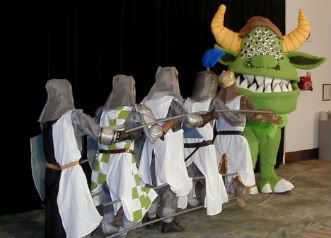I went to the Masquerade tonight. I love the Masquerade.
Here's the Legendary Black Beast of Arrrghhh!, the winner of the Holy Hand-Grenade Award. (Darren Best and Marian O'Brien Clark) BTW, the Masquerade wasn't held here, by the Men's. This is just the staging/photo area. As usual, it was held in a big theater with lighting, sound and video screens.
I also liked the costume for Garuda, and an alternate history set with Charles II and a Mexican Ambassador. The Masquerade Master of Ceremonies was Wil McCarthy.
Earlier I'd been to a panel on Alternate Histories with Harry Turtledove, Steve Stirling, Charlie Stross and others. Why do SF writers like alternate histories? In your own life you have moments you realize later were pivotal and you should have done the other thing – if you hadn't missed the bus to the interview you would have stayed in a different job and so you wouldn't have met your wife.
Writing alternative histories is a way to change things and do the right thing (or explore the wrong thing). There's also the fact that your readership is partially with you already. The background is familiar to them, and you just have to explain the changes. (Hey, this means it is historical fan fiction!) A lot of interesting ideas from a very high powered panel. All agreed that WWII stories were overdone, and all seemed to agree that The Great War was far more important, and more pivotal (WWII being really just a rematch of a war that hadn't ended decisively) and that stories set in a changed Great War would be welcome. Plan 1919 was cited as a good turning point. Half a dozen other starting points for WWI, which would have seen the countries in different states of readiness, were cited.
At the end of the panel, one member of the audience asked, "Are there any stories of smaller, more domestic changes that could have changed the world, or are they all politics and technology?" which shut the panel up immediately. I suggested the discovery/invention of contraception a thousand years ago. A gentleman next to her suggested a theory of disease that could have led to prevention or containment strategies would have changed the world utterly.
Then I went to a panel on republishing older SF works, and included quite a bit on electronic publishing and audio publishing and had some good insights into what a publisher looks for in a book in terms of sales expectations, placement in Barnes and Noble (critical) and so on.
Erik Mona said that his republished older works astonished (and pleased) younger readers who couldn't understand how in the 'old days' a pulp author could tell a whole tale – including beginning, middle and end – in 200 pages. They thought that books had to be 600 pages long (and presumably had been avoiding them for that reason).
Then I went to a panel on Dark Destinies – The Worst Future You Can Imagine, with Wil McCarthy and Michael Swanwick. The latter went straight onto my list of erudite must-see-next-time authors, with a very considered set of answers. (McCarthy was pretty good too, but Swanwick was excellent.) Some things I picked up were: Don't make your endings all dark or all light – they'll seem trite. Remember that every ending is a beginning for a new story. Evil people have rational explanations for everything they do. They aren't evil for a living. Zombies – being overwhelmed by a mass of mindless people – were very popular, as were "marching morons" scenarios. Complete control (24 hour surveillance), losing the control of your body to someone else but being forced to remain and spectate, and the possibility of losing your sense of self or identity were cited as very scary scenarios for most people.
Talking of the Masquerade and MC Wil McCarthy, Wil told what he said was the world's oldest written joke, which was:
Q: What lies beside a man's thigh and likes to poke the hole that has often been poked before?
A: A key.
I think this is a good excuse to have another couple of pictures of Jimmy Page, don't you?

Edited 08/09/08 because now I know the name of the Masquerade entry above.
No comments:
Post a Comment